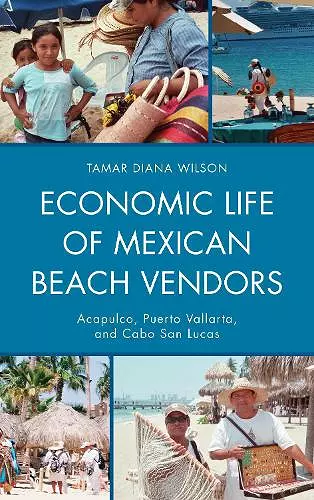Economic Life of Mexican Beach Vendors
Acapulco, Puerto Vallarta, and Cabo San Lucas
Format:Hardback
Publisher:Lexington Books
Published:2nd Nov '12
Currently unavailable, and unfortunately no date known when it will be back

Economic Life of Mexican Beach Vendors: Acapulco, Puerto Vallarta, and Cabo San Lucas is based on interviews with 82 men and 84 women who vend their wares on beaches in three Mexican tourist centers. Assuming that some people may actively choose self-employment in the informal or semi-informal economy, the employment and educational aspirations of the vendors and their levels of satisfaction with their work are explored. Most of the vendors had other family members who were also vendors, and 75 (45.2 percent) had 5 or more family members who vended, most usually on Mexican beaches. The vendors are aware of the forces of globalization (though they do not express these forces in those words), as revealed by their responses to questions as to how the current world economic recession has affected them. The beach vendors live in essentially segregated neighborhoods that can be considered apartheid-like, far from the tourist zones. Most of the vendors or their parents are rural-to-urban migrants and cross ethnic, linguistic, and economic borders as they migrate to and work in what have been called transnational social spaces. Of the vendors interviewed, 82 (49.4 percent) speak an indigenous language, and of these, 60 (73.2 percent) speak Nahuatl. The majority are from the state of Guerrero, but there were also Zapotec-speakers from Oaxaca. Both indigenous and non-indigenous women take part in beach vending. They are often wives, daughters, or sisters of male beach vendors, and they may be single, married, living in free union, or widowed. Their income is often of central importance to the household economy. This monograph aims to bring their stories to tourists and to scholars and students of tourism development and /or the informal or semi-informal economy in Mexican tourist centers.
[Wilson's] abundant biographical sketches of individual beach vendors contribute to a significant humanization of these complex creatures of contemporary globalization. * Anthropology of Work Review *
As an anthropologist living many years in Mexico, Tamar Diana Wilson has observed the vicissitudes of informal work carried out by beach vendors in their quest for a livelihood. Based on interviews in three tourism destinations, her research offers rich narratives and solid material, shedding light on how these vendors, like their counterpart street vendors around the globe, are making do under conditions of neoliberalism. Sales of souvenirs and other items typically garner little income and the vendors, many of them female and indigenous, are further marginalized by low education and few alternatives. Nonetheless, Wilson discovers not only their struggles and disappointments but their hopes and dreams and the satisfaction they take in carrying out their work. This book will be of interest to all those concerned with informal economy and tourism in Latin America and beyond. -- Florence E. Babb, author of The Tourism Encounter: Fashioning Latin American Nations and Histories
Anyone who reads this book will undoubtedly change the way they view mobile beach vendors the next time they take a sun and sand vacation. Wilson follows a long tradition of economic anthropological research that explains the daily struggles of penny capitalists through the personal lenses of largely marginalized and disenfranchised workers who find themselves selling trinkets to tourists in order to subsist. Her study is an important contribution to the study of street vendors in the tourism sector and informal economies of the Global South, precisely, because she reveals how vendors feel about their livelihoods and places their aspirations within the harsh neoliberal economic policies that have undermined traditional farming and women's work in particular. -- Walter E. Little, University at Albany, SUNY
In this meticulously documented investigation, anthropologist Tamar Diana Wilson helps us understand the backgrounds, ambitions, fortunes, and trials faced by Mexican beach vendors in three pivotal touristic zones. Combining comparative, qualitative, and quantitative research, this book offers rich and detailed findings with significant implications for policy makers and scholars alike. Examining neoliberal globalization and the history of tourism development, Wilson astutely locates the personal narratives of informants as part of global and local processes that include internal migration, land displacement, and the ebbs and flows of social networks. By also highlighting their aspirations, the study accomplishes two objectives. One, informants are not depicted as victims of macro-politics but as complex agents who craft lives of contentment and dreams, even while confronting various forms of socio-economic exclusions, inequalities, and ostracism. Secondly, the analysis of ambitions is a unique theoretical contribution to the study of the informal economy—a field of research that is crucial for understanding the forces of globalization. Economic Life of Mexican Beach Vendors is also essential reading for those interested in migration, women’s and indigenous issues, and the experiences of street vendors and the self-employed. -- Amalia L. Cabezas, University of California, Riverside
ISBN: 9780739177648
Dimensions: 235mm x 160mm x 19mm
Weight: 490g
218 pages